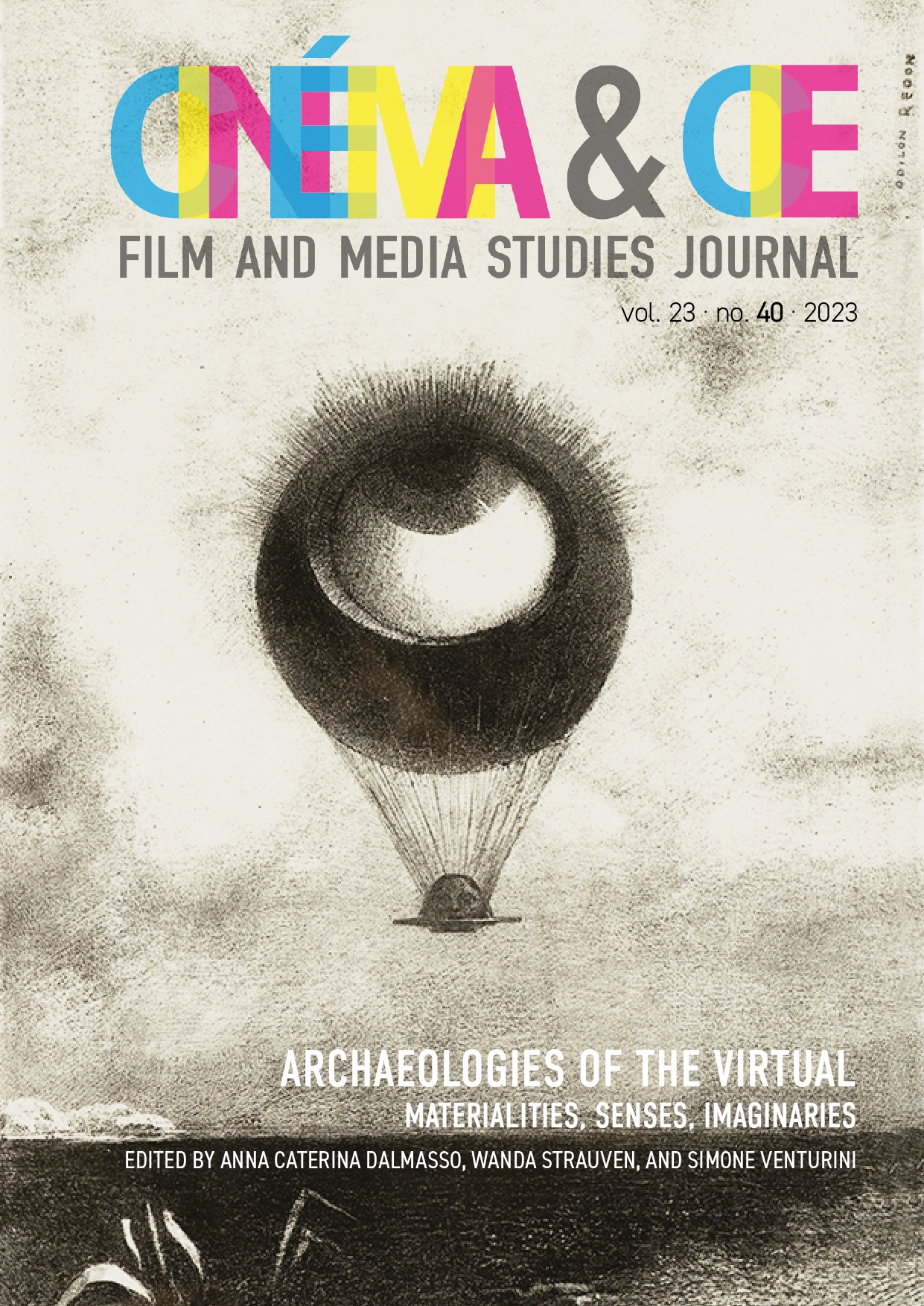Epistemology of the Feelies. Aldous Huxley’s Brave New World and the Dream of Smell Media
DOI:
https://doi.org/10.54103/2036-461X/19442Keywords:
Imaginary Media, Multisensoriality, Cultural History of Smell, Cinema of AttractionsAbstract
The essay analyses from an epistemological point of view the functions of an imaginary medium, the feelies, namely some stereoscopic, tactile, and especially olfactory movies imagined by Aldous Huxley in the futuristic dystopia Brave New World (1932). Its main goal is to comprehend the identity, functions, and objectives of yesterday’s and today’s multisensory media. In this perspective, the essay reconstructs the cultural-historical horizon which produced Huxley’s imaginary entertainment, considering the three polarities which constitute a media dispositive in the perspective of media epistemology, i.e. machinery, representation, and spectator. With regard to the mechanical function of the fictional dispositive, its ability to catch sensory spheres such as smell and touch reflects the contemporary debate on media specificity, a discussion in which Huxley himself participated with a famous 1929 article. In the same way, the fictional feely Three Weeks in a Helicopter appears as a parodic pastiche which bears the marks of various cinematic paradigms of the time: especially early “cinema of attractions”, as well as film genres which communicate directly to the spectator’s unconscious. Finally, focusing on the imaginary spectator’s experience, the essay reconnects feelies to the cultural history of olfaction, a repressed sense whose media conquest coincides with a precise form of colonization of human subjectivity.
Downloads
References
Adorno, Theodor W. (1942) 1967. “Aldous Huxley and Utopia.” Prisms, 95–117.
Albera, François, and Maria Tortajada. 2010. “The 1900 Episteme.” In Cinema Beyond Films: Media Epistemology in the Modern Era, edited by François Albera and Maria Tortajada, 25–44. Amsterdam: Amsterdam University Press.
Albera, François, and Maria Tortajada. 2015. “The Dispositive Does Not Exist!” In Cine-Dispositives. Essays in Epistemology Across Media, edited by François Albera and Maria Tortajada, 21–44. Amsterdam: Amsterdam University Press.
Albera, François. 2010. “Projected Cinema (A Hypothesis on Cinema’s Imagination).” In Cinema Beyond Films: Media Epistemology in the Modern Era, edited by François Albera and Maria Tortajada, 45–58. Amsterdam: Amsterdam University Press.
Arnheim, Rudolf. 1957. “New Laocoon: Artistic Composites and the Talking Film.” In Film as Art, 199–230. Berkeley: University of California Press.
Benjamin, Walter. (1928–34) 2006. On Hashish. Cambridge MA: Harvard University Press.
Casetti, Francesco, and Andrea Pinotti. 2020. “Post-cinema Ecology.” In Post-cinema. Cinema in the Post-art Era, edited by Dominique Chateau and José Moure, 193–218. Amsterdam: Amsterdam University Press.
Classen, Constance, David Howes, and Anthony Synnott. 2002. Aroma: The Cultural History of Smell. London/New York: Routledge.
Foucault, Michel. 1977. “Le jeu de Michel Foucault” (entretien avec D. Colas, A. Grosrichard, G. Le Gaufey, J. Livi, G. Miller, J. Miller, J.-A. Miller, C. Millot, G. Fajeman). Ornicar ? Bulletin Périodique du champ freudien 10: 62–93.
Freud, Sigmund. 1930. “Civilization and its Discontents.” In The Standard Edition of the Complete Psychological Works of Sigmund Freud, Volume XXI (1927–1931): The Future of an Illusion, Civilization and its Discontents, and Other Works, 57–146. London: Hogarth Press.
Frost, Laura. 2006. “Huxley’s Feelies: The Cinema of Sensation in Brave New World.” Twentieth Century Literature 52 (4): 443–473.
Gaudreault, André. (2008) 2011. Film and Attraction. From Kinematography to Cinema. Champaign: University of Illinois Press.
Grespi, Barbara, and Alessandra Violi, eds. 2019. Apparizioni. Scritti sulla fantasmagoria. Canterano, RM: Aracne.
Gunning, Tom. 1989. “An Aesthetics of Astonishment: Early Film and the (In)credulous Spectator.” Art and text 34 (1): 31–45.
Hediger, Vinzenz, and Alexandra Schneider. 2005. “The Deferral of Smell: Cinema, Modernity and the Reconfiguration of the Olfactory Experience.” In I cinque sensi del cinema/The Five Senses of Cinema, edited by Alice Aurelitano, Veronica Innocenti, and Valentina Re, 241–264. Udine: Forum.
Heilig, Morton. 1992. “El cine del futuro: The cinema of the future.” Presence Teleoperators Virtual Environment 1 (3): 279–294.
Huxley, Aldous. (1932) 2006. Brave New World. New York/London: HarperCollins.
Huxley, Aldous. (1958) 2000. Brave New World Revisited. New York: RosettaBooks.
Huxley, Aldous. 1929. “Silence is Golden. Being the Misanthropic Reflections of the English Novelist on First Hearing a Picture Talk.” Vanity Fair 32: 72 and 94.
Kivy, Peter. 2002. Introduction to a Philosophy of Music. Oxford: Clarendon Press.
Kluitenberg, Eric, ed. 2006. Book of Imaginary Media: Excavating the Dream of the Ultimate Communication Medium. Amsterdam/Rotterdam: De Balie-NAiPublishers.
Le Guérer, Annick. 2001. “The psychoanalysts’ nose.” The Psychoanalytic Review 88 (3): 401–53.
Morin, Edgar. (1956) 2005. The Cinema or the Imaginary Man. Minneapolis: University of Minnesota Press.
Perras, Jean-Alexandre, and Érika Wicky, eds. 2022. Mediality of Smells/Médialité des odeurs. Bern: Peter Lang.
Piesse, Septimus. (1855) 1867. The Art of Perfumery and the Methods of Obtaining the Odours of Plants. London: Longman, Green, Longman and Roberts.
Simmel, Georg. (1907) 1997. “Sociology of the Senses.” In Simmel on Culture, edited by David Frisby and Mark Featherstone, 109–19. London: Sage.
Spence, Charles. “Scent and the Cinema.” i-Perception 11 (6): 1–22.
Strauven, Wanda, ed. 2006. The Cinema of Attractions Reloaded. Amsterdam: Amsterdam University Press.
Downloads
Published
How to Cite
Issue
Section
License
Copyright (c) 2023 Giancarlo Grossi

This work is licensed under a Creative Commons Attribution 4.0 International License.





